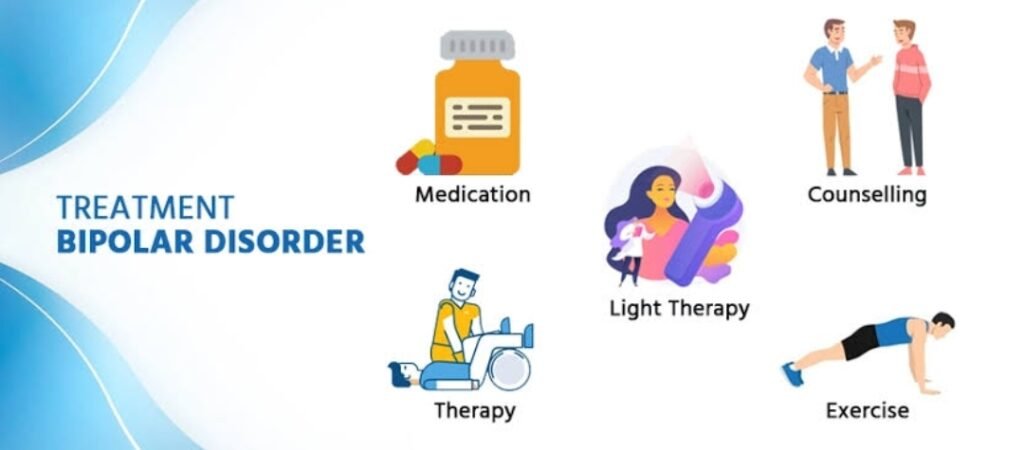Bipolar disorder, a complex mental health condition characterized by dramatic mood swings between manic highs and depressive lows, requires a comprehensive and tailored treatment approach.
Managing bipolar disorder effectively often involves a combination of medications, therapy, lifestyle changes, and support. This article provides an overview of the various treatment options available for bipolar disorder.
1. Medications
Mood Stabilizers
Mood stabilizers are a cornerstone of obsessive compulsive disorder. They help balance mood swings and prevent episodes of mania and depression. Commonly prescribed mood stabilizers include:
- Lithium: One of the oldest and most effective mood stabilizers, lithium can significantly reduce the frequency and severity of manic and depressive episodes. Regular monitoring of blood levels is required to avoid toxicity.
- Valproate (Valproic Acid): Often used for rapid cycling and mixed episodes, it is effective in stabilizing mood and reducing manic symptoms.
- Lamotrigine: Primarily used to prevent depressive episodes, it is well-tolerated and less likely to cause weight gain compared to other options.
Antipsychotics
Antipsychotic medications can be used to manage acute manic or mixed episodes and are sometimes prescribed alongside mood stabilizers. Examples include:
- Olanzapine: Effective in controlling symptoms of mania and psychosis.
- Quetiapine: Useful for both manic and depressive episodes and can be used as part of long-term treatment.
Antidepressants
Antidepressants may be prescribed to manage depressive episodes, but they are typically used in combination with mood stabilizers to avoid triggering manic episodes. Examples include:
- Selective Serotonin Reuptake Inhibitors (SSRIs): Such as fluoxetine or sertraline.
- Serotonin-Norepinephrine Reuptake Inhibitors (SNRIs): Such as venlafaxine.
2. Psychotherapy
- Cognitive Behavioral Therapy (CBT)
CBT helps individuals identify and change negative thought patterns and behaviors. It can be particularly useful in managing depressive symptoms and preventing relapse by teaching coping strategies. - Interpersonal and Social Rhythm Therapy (IPSRT)
IPSRT focuses on stabilizing daily routines and improving interpersonal relationships, which can help stabilize mood and prevent relapse. - Family-Focused Therapy
Involving family members in therapy can improve communication and support within the family unit, helping to manage the condition more effectively.
3. Lifestyle and Self-Care
- Regular Sleep Patterns
Maintaining a consistent sleep schedule is crucial for stabilizing mood and preventing manic or depressive episodes. - Healthy Diet and Exercise
A balanced diet and regular physical activity can improve overall well-being and support mood stability. - Stress Management
Techniques such as mindfulness, relaxation exercises, and stress management strategies can help reduce the impact of stress on mood swings.
4. Support and Education
- Support Groups
Joining support groups can provide valuable peer support and shared experiences, which can be encouraging and informative. - Education
Understanding bipolar disorder, its symptoms, and treatment options can empower individuals to manage their condition more effectively and advocate for their needs.
5. Electroconvulsive Therapy (ECT)
ECT may be considered for severe cases of bipolar disorder that do not respond to other treatments. It involves applying electrical currents to the brain to induce controlled seizures, which can help alleviate severe symptoms of depression or mania.
6. Hospitalization
In cases of severe episodes or when there is a risk of harm to oneself or others, hospitalization may be necessary. It provides a safe environment for stabilization and intensive treatment.
Conclusion
Bipolar disorder is a multifaceted condition that requires a personalized and multifaceted treatment approach. A combination of medications, psychotherapy, lifestyle adjustments, and support can help manage symptoms and improve quality of life. Regular follow-up with healthcare providers is crucial to adjust treatment plans as needed and address any emerging challenges.
With appropriate treatment and support, individuals with bipolar disorder can lead fulfilling and productive lives.
